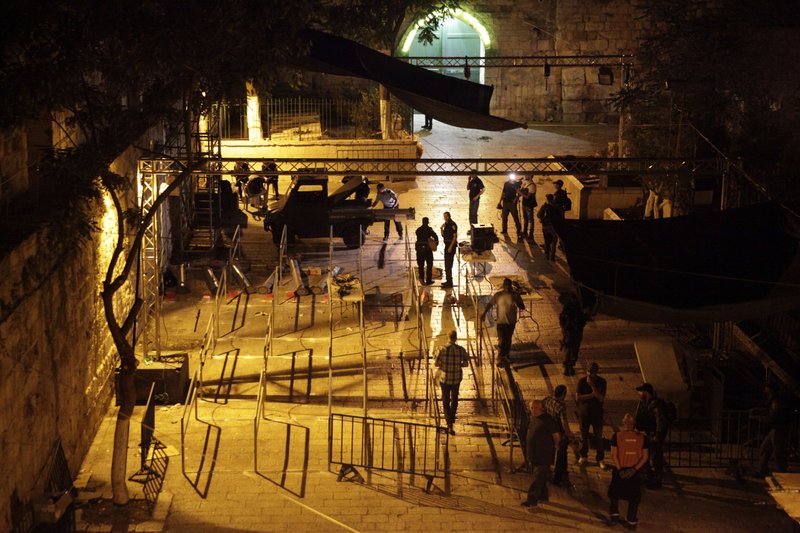
Israel began Tuesday to dismantle metal detectors it installed a week earlier at a contested Jerusalem shrine, hoping to defuse a crisis with the Muslim world, including security ally Jordan, the Muslim custodian of the holy site.
The removal of the devices followed the resolution of a 24-hour diplomatic standoff with Jordan over a deadly shooting at the Israeli Embassy in the kingdom, suggesting a broader deal had been struck.
Israeli Embassy staff, including the security guard who had killed two Jordanians after being attacked by one with a screwdriver, returned to Israel from their base in Jordan overnight.
Jordan initially said the guard could not leave without an investigation, while Israel said he had diplomatic immunity.
Israeli Prime Minister Benjamin Netanyahu and Jordan’s King Abdullah II spoke by phone late Monday to discuss the crises, including the tensions over the 37-acre (15-hectare) sacred esplanade in Jerusalem’s Old City. The walled compound is third holiest site of Islam and the holiest of Judaism, once home to biblical Temples.
The apparent deal came amid intensifying US diplomatic efforts, with President Donald Trump’s Mideast envoy, Jason Greenblatt, meeting with Netanyahu in Jerusalem on Monday.
Israel had erected metal detectors at the gates to the Muslim-administered site earlier this month, after Arab gunmen killed two Israeli police guards there.
The move incensed the Muslim world, amid allegations that Israel was trying to expand control over the site under the guise of security. The installation of the metal detectors set off mass prayer protests and deadly Israeli-Palestinian violence over the past week.
Israel has denied it has a hidden agenda, portraying the metal detectors as a needed means to prevent attacks.
Early Tuesday, Israel’s security Cabinet decided to replace the metal detectors with “advanced technologies,” reportedly cameras that can detect hidden objects. The Cabinet said police would increase deployment until the new measures are in place.
The statement said the changes would be implemented over a period of “up to six months.”
Before dawn Tuesday, workers were seen dismantling one of the devices at the Old City’s Lion’s Gate, a recent flashpoint and a scene of nightly mass prayer protests by Muslim worshippers.
It was not clear if the compromise would be accepted by Muslim and Palestinian leaders who had demanded a return to the security arrangements that were in place before the mid-July shooting attack.
Mahmoud Aloul, a senior official in Palestinian President Mahmoud Abbas’ Fatah movement, said Tuesday that any changes to the previous arrangements are unacceptable.
“Israel is an occupying power and needs to take its hands from our holy sites,” he told the Voice of Palestine radio station.
It was not clear if Aloul expressed the views of Abbas. The Palestinian president had announced last week that he was suspending all ties with Israel, including security coordination between his forces and Israeli troops in the West Bank, until the metal detectors are removed.
As custodian, Jordan has the final say over Muslim policies at the shrine, but also needs to consider public opinion, including among Palestinians in the Holy Land.
In his phone call with Netanyahu, Jordan’s king stressed the need to “remove the measures taken by the Israeli side since the recent crisis broke out” and to agree on steps that would prevent another escalation in the future, Jordan’s state news agency Petra said.
The fate of the shrine is an emotional issue at the heart of the conflict between Israel and the Palestinians.
Israel captured the Old City compound, along with other territories sought for a Palestinian state, in the 1967 war. Under arrangements put in place then, Muslims administer the site and Jews can visit, but not pray there.
Israel’s decision to remove the metal detectors came just after Israel and Jordan resolved their standoff over Sunday’s shooting at the Israeli Embassy in the kingdom.
Embassy staff was evacuated to Israel late Monday.
Meanwhile, Jordan’s Public Security Directorate said it had concluded an investigation of the incident, portraying it as a verbal spat that turned violent.
The security agency said the incident began when two Jordanians arrived at a residential building housing embassy staff to set up bedroom furniture. It said one of the Jordanians was the son of the owner the furniture store, later identified as 17-year-old Mohammed Jawawdeh.
It said an argument erupted between the son of the owner and the embassy guard because of a delay in delivering the furniture.
The argument took place in the presence of the landlord and a doorman, the agency said.
“The son of the owner attacked the Israeli diplomat and injured him,” the statement said. It said the Israeli fired toward the teen, wounding him, and also struck the landlord who was standing nearby.
The two Jordanians died of their wounds at a hospital.
Earlier Monday, al-Jawawdeh’s father, Zakariah, had called for an investigation, saying his son deserves justice. It was not clear if the findings of the security agency will satisfy him.




